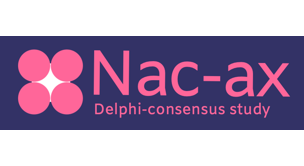NAC-AX Delphi Consensus Study
Overview
Neoadjuvant chemotherapy (NAC) is widely administered to patients with locally advanced and operable breast cancer with involved axillary nodes. The optimal strategy to stage and treat patients with nodal metastasis after NAC remains uncertain.
Poor clinical prediction of pathological response and suboptimal identification rates of sentinel nodes can lead to false reassurance with sentinel lymph node biopsy (SLNB). Previous studies (e.g. ACOSOG, SENTINA and SN FNAC) have reported a FNR of SLNB of up to 14.2% even in ycN0 patients following NAC. With a view to reduce the false negative rate (FNR), a marked lymph node biopsy (MLNB) strategy has evolved whereby the positive node is marked and removed without SLNB. Since then, the targeted axillary dissection (TAD) approach has emerged which combines MLNB with SLNB. MLNB and TAD have demonstrated promise in reducing the FNR and boast high identification rates.
Overall, there is significant variation in axillary management of patients with positive lymph nodes who receive NAC. There is variation in node localisation techniques, surgical strategy (e.g. SLNB, MLNB, TAD), decision to perform ALND and subsequent surgical management following formal pathology. The present Delphi consensus study aims to determine best practice and make international consensus recommendations for the role of minimally invasive axillary techniques in lymph node positive patients undergoing NAC.
The study will be conducted over a maximum of 3 rounds: at the end of each round, each panellist will be provided with their individual response as well as the collective response from the whole panel. Each panellist will be eligible for an authorship position on all papers that result from the investigation. Any publication, presentation or abstract will acknowledge all authors.
Objectives
- To determine best practice practice for the role of minimally invasive axillary techniques in lymph node positive patients undergoing NAC
- To make international consensus recommendations that inform the development of future axillary management guidelines for lymph node positive patients undergoing NAC
Inclusion criteria
- Panellists must be a consultant or attending breast oncology surgeon actively practicing in their respective healthcare systems
- Panellists must be practicing in a Western OECD (Organisation for Economic Co-operation and Development) Country*
- Panellists must be proficient in English to ensure clear understanding of the Delphi questions and responses
- Panellists should have a willingness to participate in multiple Delphi rounds (up to three rounds) and respond within the specified timelines
*Western OECD Countries: Australia, Austria, Belgium, Canada, Denmark, Finland, France, Germany, Iceland, Ireland, Italy, Luxembourg, Netherlands, New Zealand, Norway, Portugal, Spain, Sweden, Switzerland, United Kingdom, United States of America
Exclusion criteria
- Surgeons currently employed in non-clinical roles or administrative positions without active patient care responsibilities
Planned sample size
>500 breast oncology surgeons
Timeline
The study will be conducted over a maximum of 3 rounds from April until July.
Contact
To take part in the first round please follow this link:
https://forms.gle/Fa4WyUEzBCWXbFWBA
Contact: James Lucocq, james.lucocq@nhs.scot; nacax.delphi@gmail.com





